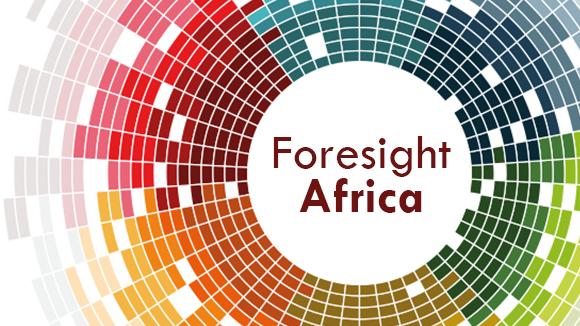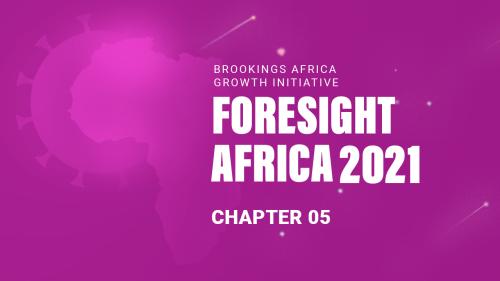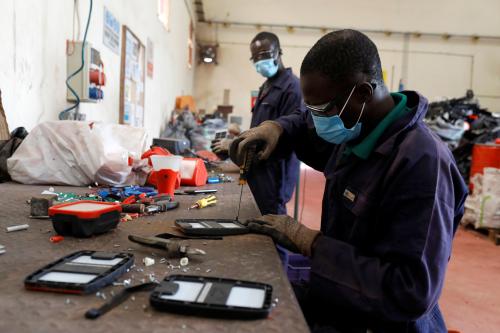Below is a Viewpoint from Chapter 5 of the Foresight Africa 2021 report, which explores top priorities for the region in the coming year. This year’s issue focuses on strategies for Africa to confront the twin health and economic crises created by the COVID-19 pandemic and emerge stronger than ever. Read the full chapter on continental integration.
 Africa was on the cusp of a revolutionary economic transformation before the COVID-19 pandemic struck, and the ensuing crisis just underlined the urgency of that process. Right now, countries across Africa are overcoming years of colonial division through the African Continental Free Trade Agreement (AfCFTA). The AfCFTA is, in many ways, a treaty that will transform Africa from a fractured, commodity-dependent group of economies into a vibrant, integrated market of over 1.2 billion people. Trading under the agreement, delayed by the pandemic, commenced on January 1, 2021. (For more on the potential gains and challenges of AfCFTA, see page 63).
Africa was on the cusp of a revolutionary economic transformation before the COVID-19 pandemic struck, and the ensuing crisis just underlined the urgency of that process. Right now, countries across Africa are overcoming years of colonial division through the African Continental Free Trade Agreement (AfCFTA). The AfCFTA is, in many ways, a treaty that will transform Africa from a fractured, commodity-dependent group of economies into a vibrant, integrated market of over 1.2 billion people. Trading under the agreement, delayed by the pandemic, commenced on January 1, 2021. (For more on the potential gains and challenges of AfCFTA, see page 63).
Despite the delay, the African Export-Import Bank (Afreximbank) has been working closely with the African Union (AU) and AfCFTA Secretariat to facilitate the agreement’s implementation. Having already disbursed close to $20 billion for intra-African trade during the last four years, Afreximbank will double this amount in the coming years as it seeks to close the annual trade finance gap in Africa estimated by the International Chamber of Commerce at $110 billion to $120 billion.
It is estimated that the fiscal losses associated with the removal of trade tariffs amounts to over $4.1 billion in the short term. Afreximbank is, therefore, working with the AU to introduce a $5 billion AfCFTA Adjustment Facility—a compensation mechanism—to help AfCFTA member countries better adjust to the fiscal and other impacts of the trade agreement. The Facility will cover the short-term fiscal losses and support medium-to-long term adjustments of production activities in African countries to enable them take advantage of the opportunities arising from the AfCFTA.
The implementation of the AfCFTA will extend beyond financing, and Afreximbank is creating tools to eliminate bottlenecks and facilitate the full realization of the deal’s potential. For example, Afreximbank’s African Trade Gateway, an agglomeration of interrelated digital platforms, will eliminate some of the challenges to intra-African trade, particularly around the complexities of payments transfers within Africa, currently-low access to trade and investment information, and costs associated with conducting Know-Your-Customer checks on African entities. Afreximbank’s Pan-African Payment and Settlement System will allow payments for intra-African trade in local currencies and save the continent several billion dollars in transfer and settlement charges, thus further boosting intra-continental trade. The Trade Information Portal will improve access to trade information and use artificial intelligence to predict supply chains across Africa by helping businesses easily identify potential suppliers of inputs or distributors of their products in other parts of the continent. The African Customer Due Diligence Repository Platform will ease the cost of conducting Know-Your-Customer checks for African corporates. The Trade Regulations Platform will aggregate all trade, finance, and investment regulations to reduce search costs for traders and investors.
Already, Afreximbank has invested over $1.7 billion recently in supporting the development of regional value chains to accelerate the process of industrialization and lift the supply-side constraints that have undermined the growth of African trade. COVID-19 has highlighted the risk of excessive dependency on non-African partners; Afreximbank is working to reverse that standard.
The Brookings Institution is committed to quality, independence, and impact.
We are supported by a diverse array of funders. In line with our values and policies, each Brookings publication represents the sole views of its author(s).







Commentary
Facilitating the transformational AfCFTA: Tools for eliminating bottlenecks
March 11, 2021